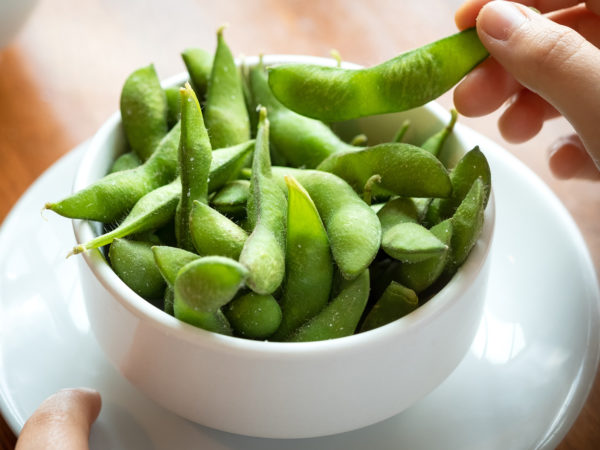Rethinking Soy?
I’ve read some of your older articles about the benefits of soy, but I’ve also read that soy should generally be avoided with the exception of properly fermented products, like miso and tempeh. Have you changed your opinion?
Andrew Weil, M.D. | August 31, 2023

I’m well aware of Internet paranoia on the subject of soy and the contention that only fermented soy is safe to consume. That belief is simply not true. Some of the best forms of soy – edamame, tofu and soy nuts – are unfermented and are much more likely to help you than hurt you. Nothing in recent research has changed my mind, and I remain a strong proponent of including whole soy products as enjoyable and healthy choices.
Claims that unfermented soy foods (such as tofu and soy milk) contain toxins that block the action of enzymes needed to digest protein, and that these toxins cause pancreatic enlargement, cancer and stunted growth in animals, are misleading. While soy does contain substances (trypsin inhibitors) that may adversely affect the pancreas in animals, there’s no solid evidence that they cause similar problems in humans. Furthermore, trypsin inhibitors are found in all of the vegetables of the cabbage family as well as in beans other than soy.
Other concerns about soy safety focus on the following issues:
- Breast cancer:Here, the idea is that high levels of isoflavones, active ingredients in soy that behave like estrogen in the body, may increase the risk of breast cancer. While high levels of isolated isoflavones may do so, it appears that the total mix of weak plant estrogens in soy protects the body by binding estrogen receptors and only partially activating them. This protection may reduce the effects of excess estrogen exposure from such external sources as meats and dairy products from hormone-treated cows as well as artificial chemicals and industrial pollutants that act as foreign estrogens. Japanese women, whose diets contain a significant amount of soy foods, have only one-fifth the rate of breast cancer that occurs among Western women. In fact, a 2022 analysis of research conducted since 2003 revealed an inverse correlation between the amount of isoflavones consumed and breast cancer occurrence in pre- and post-menopausal women; women who consumed more isoflavones showed a reduced risk of breast cancer at either stage.
- Testosterone: I have read articles contending that isoflavones can have a feminizing effect on men given that they act like estrogen, but the evidence is simply not there. A 2021 analysis looked at studies published over a ten-year period and evaluated research on thousands of men who consumed soy foods, soy protein, or isoflavone extracts. Researchers found no evidence that soy consumption affected total testosterone, free testosterone, estradiol, or estrone.
- Thyroid Problems:Excess consumption of soy can affect thyroid function, but only if you have a thyroid disorder to begin with or if you’re not getting enough iodine in your diet (a rare deficiency in the United States). If you take medication for hypothyroidism (low thyroid), and are concerned about the effect of eating two daily servings of soy, have your thyroid levels checked regularly. In otherwise healthy individuals, studies have found no association between thyroid problems and soy consumption.
- Mineral absorption:The idea that substances in soy called phytates block absorption of essential minerals is also in circulation, but there is no scientific data suggesting that soy consumption leads to mineral deficiency in humans. Phytic acid can block the absorption of calcium, so vegans or others who do not consume dairy products may want to consider calcium supplementation, but overall research finds that consumption of soy isoflavones actually supports healthy bone mass.
All told, based on the evidence to date, I see no reason to worry about eating whole soy foods, whether fermented or not. I still recommend consuming one to two servings of soy per day, an amount equivalent to one cup of soy milk, or one-half cup of tofu, soy protein (tempeh) or soy nuts.
Andrew Weil, M.D.
Sources
Boutas I, Kontogeorgi A, Dimitrakakis C, Kalantaridou SN. Soy Isoflavones and Breast Cancer Risk: A Meta-analysis. In Vivo. 2022 Mar-Apr;36(2):556-562. doi: 10.21873/invivo.12737. PMID: 35241506; PMCID: PMC8931889. pubmed.ncbi.nlm.nih.gov/35241506/
Reed KE, Camargo J, Hamilton-Reeves J, Kurzer M, Messina M. Neither soy nor isoflavone intake affects male reproductive hormones: An expanded and updated meta-analysis of clinical studies. Reprod Toxicol. 2021 Mar;100:60-67. doi: 10.1016/j.reprotox.2020.12.019. Epub 2020 Dec 28. PMID: 33383165. pubmed.ncbi.nlm.nih.gov/33383165/
Otun J, Sahebkar A, Östlundh L, Atkin SL, Sathyapalan T. Systematic Review and Meta-analysis on the Effect of Soy on Thyroid Function. Sci Rep. 2019 Mar 8;9(1):3964. doi: 10.1038/s41598-019-40647-x. PMID: 30850697; PMCID: PMC6408586. pubmed.ncbi.nlm.nih.gov/30850697/
Mangels AR. Bone nutrients for vegetarians. Am J Clin Nutr. 2014 Jul;100 Suppl 1:469S-75S. doi: 10.3945/ajcn.113.071423. Epub 2014 Jun 4. PMID: 24898231. pubmed.ncbi.nlm.nih.gov/24898231/
hsph.harvard.edu/nutritionsource/soy/
Originally Posted March 2003. Updated August 2023.









